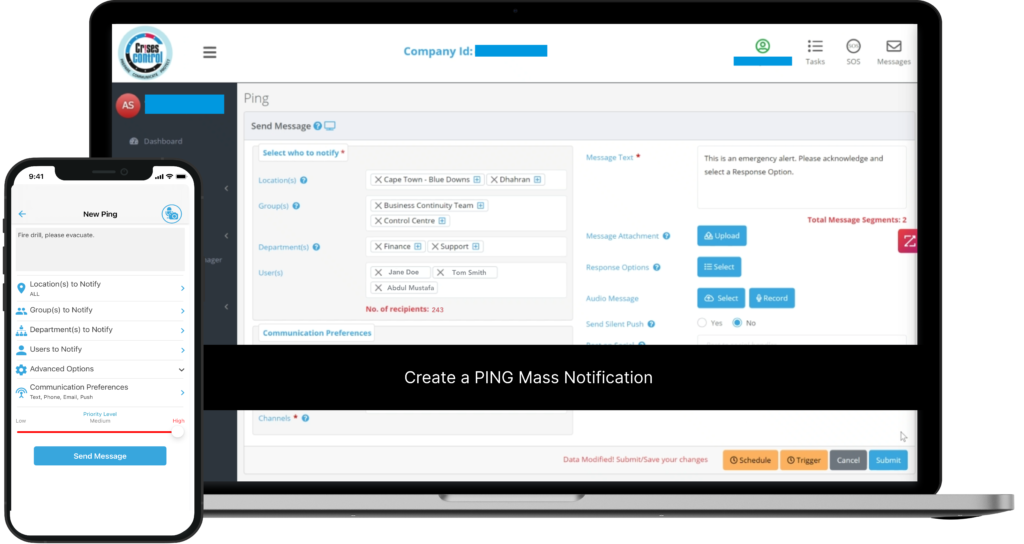Written by Anneri Fourie | Marketing Executive
In today’s fast-paced business environment, ensuring robust business continuity is not just a necessity—it’s a strategic advantage. One critical component of achieving this is implementing an effective emergency communication system. Traditional systems often fall short during crises due to their limitations in scalability, accessibility, and resilience. This is where cloud-based emergency communication systems come into play, transforming how businesses handle emergencies and ensuring that operations continue smoothly, even when disruptions occur.
In this blog, we’ll explore the impact of cloud-based emergency communication systems on business continuity and highlight how Crises Control can enhance your crisis management strategy.
Understanding Cloud-Based Emergency Communication Systems
What is a Cloud-Based Emergency Communication System?
A cloud-based emergency communication system leverages cloud computing technology to manage and deliver critical information during emergencies. Unlike traditional on-premise systems, cloud-based solutions offer a range of benefits, including enhanced scalability, improved accessibility, and resilience. By storing data and communication tools in the cloud, businesses can ensure that their emergency response mechanisms are not only effective, but also adaptable to various crisis scenarios.
Advantages Over Traditional Systems
Traditional emergency communication systems often face limitations due to their reliance on physical infrastructure and localised hardware. Cloud-based systems, on the other hand, utilise the internet to deliver real-time alerts, notifications, and updates. This shift provides several key advantages, including:
- Scalability: Easily adjust the system to accommodate changing needs and growing organisational requirements.
- Accessibility: Access critical communication tools from anywhere at anytime, ensuring that teams remain connected even during major disruptions.
- Resilience: Benefit from cloud-based redundancy and backup solutions that maintain operations during unforeseen outages or disasters.
- Instant Communication: Enable real-time alerts and updates, ensuring all stakeholders receive critical information as soon as it becomes available.
- Integration with Existing Systems: Seamlessly coordinate with other systems like HR and IT management platforms to enhance overall crisis management.
- Cost Efficiency: Reduce expenses by eliminating the need for extensive hardware and minimising maintenance costs while benefiting from advanced communication capabilities.
Let’s delve deeper into how these advantages transform emergency communication systems.
1. Scalability: Adapting to Your Business’s Evolving Needs
Flexible Scaling for Diverse Needs
One of the most significant benefits of a cloud-based emergency communication system is its scalability. Unlike traditional systems that require extensive hardware upgrades to handle increased communication demands, cloud-based systems can seamlessly scale up or down. Whether your business is experiencing rapid growth or dealing with a temporary reduction in staff, a cloud-based solution can easily adapt to meet your needs.
How Crises Control Supports Scalability
Crises Control’s cloud-based emergency communication system is designed with scalability in mind. Our solution allows businesses to effortlessly adjust their communication capabilities in response to changing conditions. With Crises Control, you can expand or contract your system as needed, ensuring that your emergency response remains effective regardless of organisational changes.
2. Accessibility: Ensuring Communication Anytime, Anywhere
The Importance of Remote Access
In emergencies, access to communication tools from any location is crucial. Cloud-based systems offer the flexibility to manage and respond to crises from anywhere, whether employees are working remotely or on-site. This remote access ensures that key personnel can stay informed and take action, regardless of their physical location.
Crises Control’s Commitment to Accessibility
Crises Control’s emergency communication system provides 24/7 access through its cloud-based platform. Our solution ensures that you can manage and communicate during a crisis from any device with internet connectivity. This level of accessibility is vital for maintaining effective communication and coordination, especially when teams are dispersed or facing travel restrictions.
3. Resilience: Maintaining Operations During Disruptions
Ensuring Business Continuity Through Resilience
Cloud-based emergency communication systems are built with resilience in mind. They include features such as data redundancy, backup solutions, and failover mechanisms that ensure continuity of operations even during major disruptions. This resilience is crucial for minimising downtime and maintaining business operations when faced with unforeseen challenges.
Crises Control’s Resilient Infrastructure
Crises Control’s cloud-based infrastructure is designed to deliver unparalleled resilience. Our system operates on a robust cloud platform that includes redundant data storage and backup capabilities. This ensures that your emergency communication tools remain operational even if there are outages or disruptions in other parts of your IT infrastructure. With Crises Control, you can be confident that your communication system will remain functional when it matters most.
4. Real-Time Alerts and Updates: Keeping Everyone Informed
The Role of Instant Communication
Effective crisis management relies on timely and accurate communication. Cloud-based emergency communication systems enable real-time alerts and updates, ensuring that all stakeholders receive critical information as soon as it becomes available. This immediacy is essential for making informed decisions and coordinating responses during emergencies.
How Crises Control Delivers Real-Time Alerts
Crises Control’s system excels in delivering real-time alerts through multiple channels, including SMS, email, and mobile push notifications. Our platform ensures that you can reach all relevant parties quickly and efficiently, keeping everyone informed and enabling swift action. This capability is key to managing crises effectively and ensuring a coordinated response.
Interested in our Cloud-Based Mass Notification Software?
Efficiently alert everyone in seconds at scale with our Mass Notification System – PING, get the message out fast and ensure rapid response and recovery.

5. Integration with Existing Systems: Seamless Coordination
Enhancing Crisis Management with Integration
A cloud-based emergency communication system should integrate seamlessly with your existing crisis management and business continuity plans. This integration ensures that your emergency communication tools work in harmony with other systems, such as HR and IT management platforms.
Crises Control’s Integration Capabilities
Crises Control offers robust integration options with a wide range of existing systems. Our solution can connect with your current infrastructure, enhancing overall crisis response and management. Whether you need to integrate with HR systems for employee notifications or IT systems for incident tracking, Crises Control provides the flexibility to ensure seamless coordination.
6. Cost Efficiency: Maximising Value While Reducing Expenses
The Financial Benefits of Cloud-Based Solutions
Cloud-based emergency communication systems offer significant cost advantages compared to traditional systems. By eliminating the need for extensive hardware and reducing maintenance costs, businesses can achieve substantial savings while benefiting from advanced communication capabilities.
Crises Control’s Cost-Effective Approach
Crises Control’s cloud-based emergency communication system is designed to provide high functionality at a cost-effective price. Our solution minimises upfront investments and ongoing maintenance costs, delivering excellent value while ensuring that your business remains prepared for any crisis. With Crises Control, you can invest in top-tier emergency communication capabilities without breaking the bank.
ROI with Crises Control
Investing in Crises Control not only enhances your crisis management capabilities, but also significantly boosts your ROI by reducing downtime, streamlining communication, and ensuring continuous improvement.
Conclusion
In a world where business continuity is paramount, a cloud-based emergency communication system is a crucial asset. The advantages of scalability, accessibility, resilience, and real-time communication make it an essential component of modern crisis management. Crises Control’s advanced cloud-based solution is designed to meet these needs, ensuring that your business remains prepared and operational during any crisis.
Ready to enhance your emergency communication capabilities and ensure business continuity? Contact us today to schedule a free demo and see how Crises Control can transform your crisis management strategy.
Request a FREE Demo

